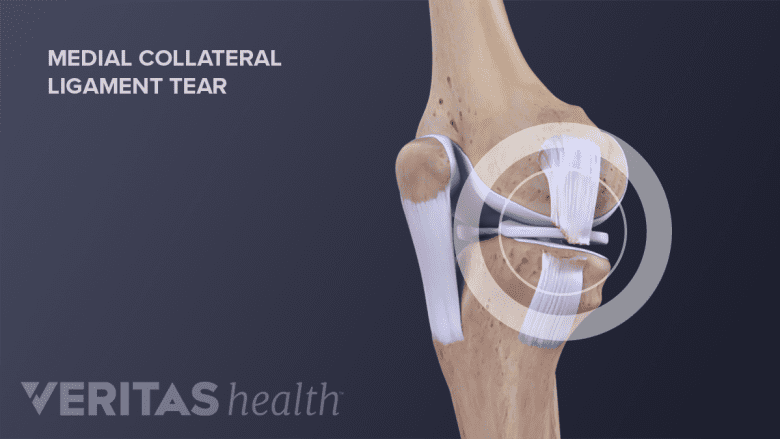The medial collateral ligament (MCL) is located on the inside of the knee and is often injured while playing sports, such as hockey, volleyball, or skiing. People with MCL tears or sprains often hear a “popping” sound accompanied by immediate pain around the inner knee after being injured.
A torn MCL can cause pain, tenderness, swelling, and a sensation of increased knee mobility.
What Is the MCL?
Ligaments are strong fibrous bands that connect bones to other bones. In the knee, the MCL is one of the 4 main ligaments that connect the femur (thigh bone) to the tibia (shin bone).
The MCL, located on the inside of the knee (medial knee), has two parts: a superficial and deep portion. The superficial part attaches to the tibia, or shin bone, 6cm below the knee joint. The deep part attaches immediately below the knee joint and is also connected to the meniscus. Additionally, the MCL attaches to the femur, or thigh bone, next to a boney protrusion in the knee, called the medial epicondyle.
In This Article:
- Medial Collateral Ligament (MCL) Tears and Sprains
- Symptoms of MCL Sprains and Tears
- MCL Sprains and Tears: Causes and Risk Factors
- Diagnosing MCL Sprains and Tears
- Treatment Options and Recovery for MCL Sprains and Tears
The knee is a hinge joint that allows forward and backward movement, with minimal side-to-side movement. The MCL’s main function is to minimize side-to-side movement, thereby protecting the knee from over-extending inward providing stability to the joint.
The MCL Tear Grading System
Like other ligament injuries, MCL injuries are often classified using a grading system.
- Grade I tears refer to minor sprains or overstretching of the MCL. Symptoms are typically mild; pain is usually localized to the spot where the MCL has been stretched or injured.
- Grade II tears are considered partial or incomplete tears of the MCL. The symptoms include pain and swelling, and instability when cutting or pivoting.
- Grade III tear (ligament rupture) are complete tears of the MCL and the most severe injury. Grade III tears may also be referred to as an MCL rupture. Symptoms include significant pain and swelling, instability (the feeling of giving out), and difficultly bending at the knee.
MCL injuries can produce a range of symptoms, sometimes making them difficult to diagnose without medical imaging.






